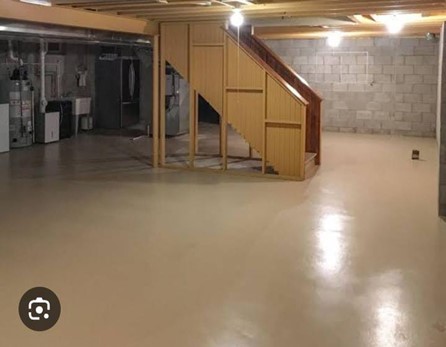
Basement waterproofing is vital yet often ignored in home upkeep. Many homeowners fail to recognize water damage. It can harm basements, impacting health, finances, and property value. This article explains why basement waterproofing is a must. It details its long-term benefits.
Basements are versatile. They can be storage, recreation, or office spaces. They can also be extra living quarters. Their underground location makes them vulnerable to water damage. Standing water can ruin items, furniture, and appliances. It also damages mementoes and documents.
Moreover, it can weaken the foundation. Over time, moisture harms concrete, causing cracks and expensive repairs. Basement waterproofing shields against water. It protects your belongings and your home's structure.
A wet basement encourages mold and mildew, which are harmful to health. Mold spores in the air can cause allergies, asthma, and breathing problems. For people with weak immune systems, mold can lead to serious infections. Making the basement waterproof keeps it dry, preventing mold and protecting health. Also, removing moisture gets rid of musty smells. This creates a fresher, more pleasant living space.
Waterproofing your basement boosts your home's value. Buyers prefer dry, usable basements. They signal a well-maintained property. This reduces worries about water damage, mold, and structural issues. In competitive markets, a waterproofed basement stands out. It draws buyers and can increase the selling price.
A waterproof basement adds living space. You can create a home theater, game room, office, or guest suite. Alternatively, consider making it a rental unit. This approach boosts your home's value and functionality, avoiding expensive additions or renovations.
Water seepage wreaks havoc on basements, draining wallets faster than foundations. Waterproofing may seem costly at first. But, it's cheap compared to repair bills. Damp walls and floors demand expensive fixes. Soggy insulation saps energy efficiency and overworking HVAC systems. Protecting your basement now avoids high costs later. It will save your home and budget. Waterproofing the basement saves energy. It keeps the space dry and insulated. This lowers energy bills and your carbon footprint.
A damp basement lowers indoor air quality throughout your house. Moisture promotes dust mites and allergen growth, circulating through your HVAC system. Waterproofing makes a home drier and healthier. It improves air quality and comfort.
Knowing your basement is watertight brings peace of mind. Rest easy. Your belongings and home are safe. You protect your family's health. This reduces stress and allows you to fully enjoy your home.
For basement waterproofing projects, enlist qualified professionals. Experienced waterproofing contractors assess your needs, recommend appropriate methods, and ensure proper installation. They also tell of the best solutions for your local climate and soil conditions.
Many methods exist for waterproofing a basement. Each has pros and cons. The right method depends on the water problem's severity, your home's age and construction, your budget, and local climate.
Interior methods manage water already inside the basement. It involves installing drainage systems, like French drains or sump pumps. These redirect water. From walls to floors, waterproof sealants offer interior protection. Epoxy and polyurethane coatings create impenetrable barriers, safeguarding spaces against moisture intrusion.
Interior waterproofing is cheaper than exterior methods. But, it is more reactive.
Exterior methods prevent water from reaching the foundation. This involves digging around the foundation. Coat walls with waterproof barriers like bentonite clay or rubberized asphalt. These membranes shield against moisture intrusion, ensuring long-lasting protection for your structure. Finally, install drainage systems. Exterior waterproofing is a better, but costlier and more disruptive, method. It's more proactive and thorough.
Basement waterproofing costs vary based on basement size, the chosen method, the problem's extent, and your location. Interior methods typically range from a few hundred dollars for minor repairs to several thousand for extensive work. Exterior waterproofing is usually more expensive. It costs several thousand to tens of thousands of dollars for complex projects. The initial cost may seem high. Waterproofing pays off. It cuts repair costs, lowers energy bills, and hikes home value. A smart move for any homeowner.
You can do some minor waterproofing tasks yourself. But, complex issues require a professional. Botched waterproofing often exacerbates issues. Experts bring vital skills, equipment, and know-how. They create durable, reliable solutions that last. For significant water issues or complex projects, professional waterproofing is recommended.
Basement moisture-proofing is an essential investment. It has many benefits. It will protect your valuables and health. It will boost your home's value and function. And it will give you peace of mind. Waterproof your basement. It will protect your investment. It will also ensure a dry, healthy home for years to come. Consult a waterproofing expert from HomeBuddy. They can assess your needs and find the best solutions.
1. What are the signs that my basement needs waterproofing?
Signs include water stains, dampness, and musty odors. Check for efflorescence, cracks, water seepage, and mold. Even without visible water damage, it's wise to waterproof. This is especially true in areas with high water tables or frequent rain.
2. What is the best method for waterproofing my basement?
The best method depends on the water issue's severity, your home's design, your budget, and the local climate. Exterior waterproofing is often the best solution. It stops water from reaching the foundation. Interior methods manage water already present but may not address the root cause. A qualified professional can recommend the best approach.
3. How much does basement waterproofing cost?
Costs vary based on basement size, the chosen method, the problem's extent, and location. Interior waterproofing can cost a few hundred dollars for minor repairs. It can run to several thousand for extensive work. Exterior waterproofing usually starts at a few thousand dollars. It can reach tens of thousands for complex projects. Get quotes from reputable contractors. Compare prices to ensure a fair price for quality work. Remember, waterproofing is an investment that can prevent costly repairs later.